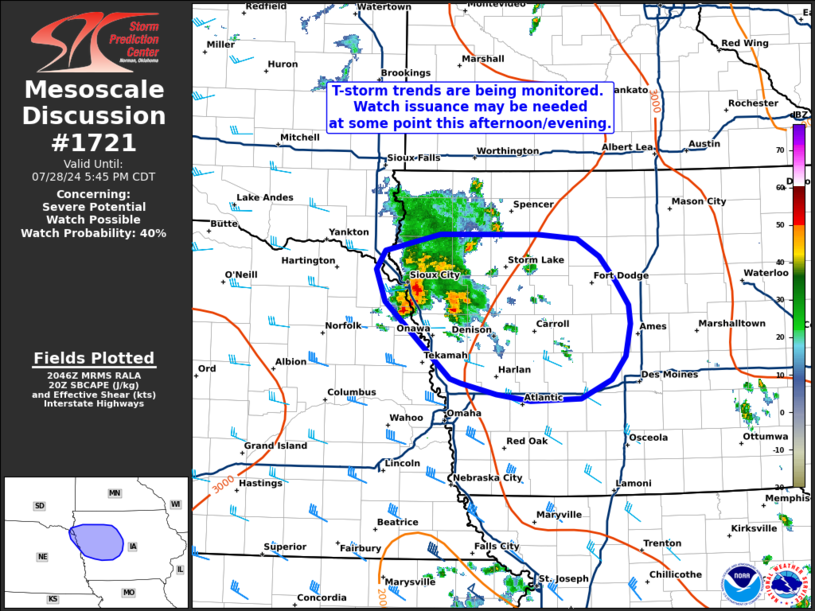|
| Mesoscale Discussion 1721 |
|
< Previous MD Next MD >
|

|
Mesoscale Discussion 1721
NWS Storm Prediction Center Norman OK
0349 PM CDT Sun Jul 28 2024
Areas affected...Northwest to central Iowa
Concerning...Severe potential...Watch possible
Valid 282049Z - 282245Z
Probability of Watch Issuance...40 percent
SUMMARY...Thunderstorms associated with an MCV across the mid
Missouri River Valley have shown some signs of intensification over
the past half hour. Trends will continue to be monitored for the
need for a watch at some point this afternoon/evening.
DISCUSSION...Convection has been ongoing for much of the day across
eastern NE as a residual MCV meanders across the mid-MO River
Valley. Much of this activity has been driven by a combination of
ascent associated with the MCV as well as modest warm air advection
between 850-700 mb. Regional VWPs across eastern KS have shown some
strengthening of the low-level flow within this warm advection
regime, suggesting that lift is gradually increasing. Concurrently,
daytime heating through broken cloud cover has allowed for
temperatures to climb into the upper 80s across eastern NE into IA
with a corresponding reduction in surface-based inhibition.
Consequently, convection has shown some signs of intensification
over the past 30 minutes, including weak mid-level rotation and
periodic lightning jumps with the deeper, more intense updrafts.
Given moderate SBCAPE and sufficient deep-layer shear, organized
convection appears possible, but storm mode remains uncertain. More
discrete cells developing on the southern periphery of the MCV
(where warm advection ascent should be strongest) may pose a large
hail threat before storm interactions promote gradual upscale growth
- possibly into an organized cluster later this evening. More recent
GOES one-minute imagery shows that the more intense updraft pulses
remain somewhat short lived, possibly indicating that stronger
forcing for ascent (in the form of an even stronger low-level jet
this evening) will be required to fully realize the convective
environment. Trends will continue to be monitored, and watch
issuance is possible at some point later this afternoon/evening.
..Moore/Gleason.. 07/28/2024
...Please see www.spc.noaa.gov for graphic product...
ATTN...WFO...DMX...FSD...OAX...
LAT...LON 41639587 42319667 42609677 42789667 42929599 42929480
42889434 42729407 42509387 42299371 42119369 41829376
41629392 41459429 41439491 41489531 41589575 41639587
|
|
Top/All Mesoscale Discussions/Forecast Products/Home
|
|



